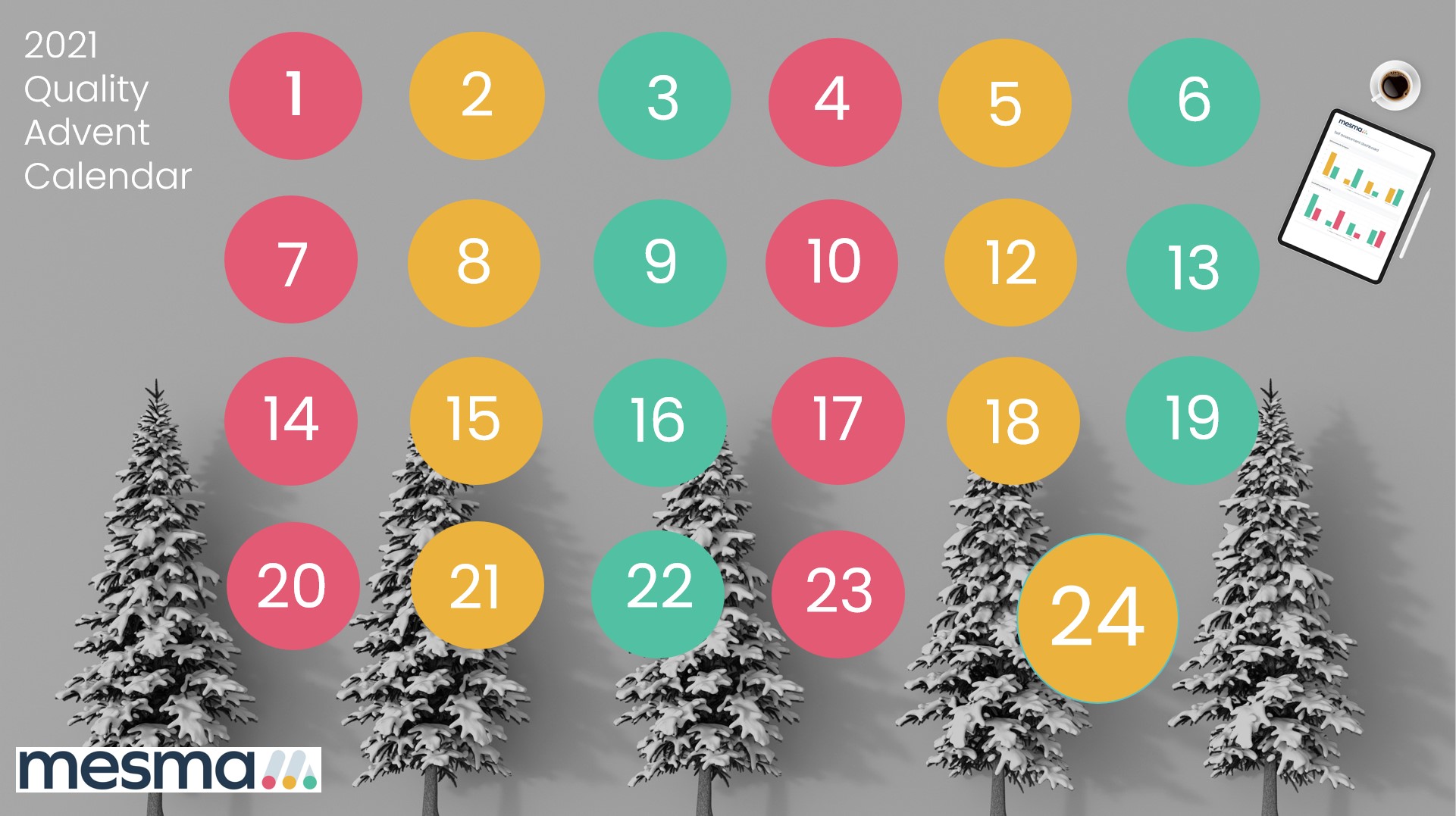Every day in December 2021 on the Mesma LinkedIn page we opened the Mesma Quality Advent Calendar to reveal a festive top tip for quality assurance and quality improvement.
We’ve rounded all 24 of the hints and tips that are focused on quality assurance, quality improvement, observations, thematic review, and preparedness for inspection.
Each tip is taken from the many webinars, resources, and events we’ve been proud to be part of in 2021.
We’re looking forward to sharing more quality assurance and quality improvement-focused events with you in 2022.
Day1: Don’t let self assessment drift into quality improvement planning. Write about why you need to improve something not how you will improve it. Consider how much future tense you are using.
Day 2: Start self assessment by reviewing your evidence against your quality standards and your key quality and performance indicators. It’s tempting to get straight into writing the judgements and making the evidence fit.
Day 3: When writing your self assessment report always challenge yourself and others to ask “so what?” Ask it again until you’re sure that it matters and why, and then write about it like that. If it doesn’t really matter, leave it out.
Day 4: Think of self assessment like great storytelling. What does your story say about your provision? Every compelling story has challenges, adversity, action, heroes, and triumphs.
Day 5: In self assessment, data is the engine that drives evaluation and judgements. Use what it’s telling you to shape the story. Don’t use it like a camera. A snapshot can’t tell your story on its own.
Day 6: Be clear on what are your strengths and weaknesses in your self assessment report. Where there are weaknesses create a clear link between your SAR and QIP so that you (and everyone else) can clearly see in your QIP how you are going to overcome them.
Day 7: Regularly review your Quality Assurance practices to ensure that they are sufficiently robust. Ask yourself if they help your leaders to understand what it’s like to be a learner / student /customer with you.
Day 8: Knowing the differences between descriptive, analytical, critical/evaluative, and reflective language will help you and your teams write the story for your SAR.
Day 9: Inspectors can only inspect what they see, so if you have something you are particularly proud of, sets you out from the crowd, or maybe good practice for personal development – make sure you show them!
Day 10: Seek out networks of quality assurance professionals where you can share ideas, resources and problems. E.g. Mesma’s online community on LinkedIn will help you to widen your circle.
Day 11: Recording expected and actual impact is vital to your quality improvement plan. Think about how you are capturing, tracking, measuring and reporting impact for your learners/students/customers or employers
Day 12: Be careful not to make your quality improvement plan too granular, too task-based. Don’t think of it as your operational do list – it should clearly relate to the priorities in your self assessment report.
Day 13: The culture of quality improvement in your organisation is vital. Creating a culture of ‘high challenge, low threat’ encourages your colleagues to embrace your QA practices for the benefit of your learners/students/customers.
Day 14: Think of self assessment and improvement planning as a flow of information bottom up to top-down. Self assessment information should come up to a strategic level and inform the quality improvement priorities which then filter back.
Day 15: A self assessment report is an output of a continual cycle of quality assurance activities which could include… observations, deep dives, surveys, stakeholder feedback, reviews, action learning sets… etc. etc.
Day 16: The best way to approach quality assurance is with continuous curiosity. Ask the questions which help you to understand not just if something happens but if it happens well.
Day 17: Don’t be tempted to only focus on areas of weakness – it’s impossible to fix everything all at once. Consider focusing some resources on things you are doing well that you can take from great to amazing.
Day 18: Does your organisation have clearly defined quality performance indicators that are well communicated to your colleagues? Think about how you measure your Q-KPIs and what impact this has on behaviors.
Day 19: Ensure that the stated and actual purpose of your observations is the same. If they are designed to measure performance but are communicated as development support your observees will notice.
Day 20: Ofsted inspectors will not grade individual lessons or teachers. They say “The sequence of lessons, not an individual lesson, is the unit of assessment – inspectors will need to evaluate where a lesson sits in a sequence, and leaders ’/teachers’ understanding of this.” (Ofsted, “Inspecting the Curriculum” 2019)
Day 21: Make your improvement goals FAST not just SMART. Embedded in FREQUENT discussion, AMBITIOUS in scope; measured by SPECIFIC metrics and milestones; and TRANSPARENT for everyone in the organisation to see. (MIT Sloan Management Review)
Day 22: As much as anything else your self evaluation should be a celebration of achievements.
Day 23: Always be clear on who is responsible or accountable for activity and who should be consulted or informed – remember “RACI”. Mesma software will only allow one person to be allocated activity on the improvement plan in line with this principle.
Day 24: Find a critical friend who can give you a valuable external perspective. The team at Mesma feels privileged to have provided support to the sector for over a decade. We look forward to working with you in 2022 and beyond.
Keep up to date with all the latest by registering to receive updates by email or join our LinkedIn community.


